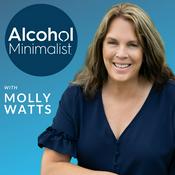On this episode of The Alcohol Minimalist Podcast, Molly reflects on what would have been her mother’s 95th birthday and the years lost not only at the end of her life, but throughout decades spent in active addiction. With compassion and clarity, she explores the difference between alcohol dependence and alcohol reliance, and why that distinction matters more than most people realize.
Drawing from her recent conversation with Dr. Charles Knowles , Molly breaks down the difference between the small percentage of adults who are physically dependent on alcohol and the much larger group who fall into gray area drinking or alcohol reliance. She explains how neuroadaptation occurs over time, how reinforced thought patterns shape behavior, and why learned helplessness can quietly keep people stuck.
This episode is not about blame. It is about progression, influence, and the hopeful reality that most people questioning their drinking are not powerless. Through science, reflection, and practical questions, Molly invites listeners to examine the beliefs that may be giving alcohol more authority than it actually has.
In This Episode:
Reflecting on the years lost to active addiction
The difference between alcohol dependence and alcohol reliance
The 2 to 3 percent statistic on physical dependence
The 20 percent gray area drinking category
How neuroadaptation and tolerance develop over time
Dopamine as a learning signal, not just a pleasure chemical
Cue conditioning and incentive salience
The psychology of learned helplessness
Why belief shapes behavior and behavior reinforces belief
Alcohol’s health risks, including cancer and sleep disruption
Why low risk drinking guidelines reduce harm, not risk
The importance of examining your belief system around alcohol
Key Takeaways:
Physical dependence develops gradually through repeated reinforcement and neuroadaptation.
Most people questioning their drinking are not physically dependent but are operating in reinforced patterns.
Alcohol influences the brain but does not automatically remove agency unless long term dependence has shifted the baseline.
Beliefs such as “Once I start, I can’t stop” can strengthen neural expectation and reduce effort.
Small cognitive shifts precede behavioral shifts, and repeated behavior reshapes the brain.
Questions to Reflect On This Week:
What belief about alcohol might you be carrying that deserves closer examination?
Is there a sentence you repeat internally such as “I need it to relax” or “It helps me connect” that feels solid and unquestioned?
What might happen if you approached that belief with curiosity rather than judgment?
What is one small step you can take this week to observe rather than act automatically?
Resources Mentioned:
Molly’s interview with Dr. Charles Knowles
Alcohol Truths: How Much Is Too Much?
If you are questioning your relationship with alcohol, remember that awareness is the first step.
Change does not require a dramatic declaration. It begins with curiosity, clarity, and small shifts practiced steadily over time.
Low risk drinking guidelines from the NIAAA:
Healthy men under 65:
No more than 4 drinks in one day and no more than 14 drinks per week.
Healthy women (all ages) and healthy men 65 and older:
No more than 3 drinks in one day and no more than 7 drinks per week.
One drink is defined as 12 ounces of beer, 5 ounces of wine, or 1.5 ounces of 80-proof liquor. So remember that a mixed drink or full glass of wine are probably more than one drink.
Abstinence from alcohol
Abstinence from alcohol is the best choice for people who take medication(s) that interact with alcohol, have health conditions that could be exacerbated by alcohol (e.g. liver disease), are pregnant or may become pregnant or have had a problem with alcohol or another substance in the past.
Benefits of “low-risk” drinking
Following these guidelines reduces the risk of health problems such as cancer, liver disease, reduced immunity, ulcers, sleep problems, complications of existing conditions, and more. It also reduces the risk of depression, social problems, and difficulties at school or work.
★ Support this podcast ★



